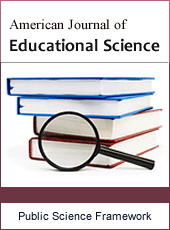American Journal of Educational Science
Articles Information
American Journal of Educational Science, Vol.4, No.2, Jun. 2018, Pub. Date: Jul. 23, 2018
Survey of Mentors’ Roles in Guiding and Supporting Novice Teachers in Dangila District Elementary Schools, Ethiopia
Pages: 13-20 Views: 2070 Downloads: 542
[01]
Asrat Kelkay, Department of Teacher Education and Curriculum Studies, College of Education and Behavioral Science, Bahir dar University, Bahir Dar, Ethiopia.
The purpose of this study was to assess the roles and responsibilities of mentors in guiding and supporting novice teachers in primary schools of Dangila district. In doing so, an attempt was made to answer the basic questions; Do mentors guide and support novice teachers effectively? What are the conditions that affect the mentoring relationship between mentors and novice teachers? Is there a healthy relationship between mentors and novice teachers? And what are the major problems facing to novice teachers? The method used to conduct this study was descriptive survey. 14 primary school in Dangila district were selected using simple random technique. Before dispatching the questionnaires, pilot test was conducted and proved by using alpha coefficient. Its’ internal consistency was 0.85. Mentors, novice teacher, and principal respondents were selected randomly to fill out the questionnaire properly. Data gathered from 33 mentors, 63 novice teachers, and 14 principals were analyzed and interpreted. Furthermore, portfolio of novice teachers and information obtained through observation were incorporated. The findings of the study indicated that mentors did not guide and support novice teachers effectively, although mentors seem good in knowing their roles and responsibilities. Absence of training, shortage of time and logistic, lack of interest, few number of experienced teachers in remote schools and absence of planned regular meeting were identified an crucial factors that affect mentoring relationship. The relationship between mentors and novice teachers was found good. Accommodating students’ difference, in- effective evaluation, and absence of well developed content knowledge were identified as problem facing the novice teachers. Providing mentoring training, encouraging experienced teachers to retain in the remote schools for longer years, appropriate support by district expert and sharing experience from experienced teachers are some of the possible solutions.
Mentoring, Mentors, Novice Teacher, Guiding and Supporting, Elementary School
[01]
Weaver, P. E. (2012). The culture of teacher and mentoring for compliance. Journal of Association for childhood Education International, 80 (5), 258-260.
[02]
Dantonio, M (2009). Collegial coaching: Inquiry in to the teaching self. Blooming, IN: ph: Delta Kappa.
[03]
Ministry of Education (2004). A Practical Guide to Mentoring, Coaching and Peer-networking: teacher professional development in schools and colleges. New York: Michael stokes and Geoff Hampton.
[04]
Donaldson, G. (2008). Mentoring in childhood Education. Retrieved October 25, 2010, from http://www.hmie.gov.uk/documents/publication/mite.html.
[05]
Ministry of Education, (2010). Continuous Professional Development for primary and Secondary School teachers, leaders, and supervisors in practical skills of mentoring. Addis Ababa, Ethiopia.
[06]
Gagen, et al (2013). Effective mentoring: A case for training mentors for novice teachers. The Journal of physical education. Retrieved on October 19/2004, 2010, from http://www.highbeamcom/doc/: 1E1-136563.htm.
[07]
Anthony, T. D, & Kristsonis, W. A (2014). National Implications: An analysis of E-Mentoring Induction year program for Novice alternatively certified teachers. From http//www.
[08]
Smith, T & Ingersoll, R (2012). What are the effects of indication and mentoring on beginning teacher turnover? American Educational Journal, vol. 34.
[09]
Ministry of Education, (2015). Framework of teacher professional competency standard. Addis ababa, Ethiopia.
[10]
Rhodes, C. (2004). A Practical Guide to Mentoring, Coaching and Peer-networking: teacher professional development in schools and colleges. New York: Michael stokes and Geoff Hampton.
[11]
Wildman, T. M. et al. (1992). Teacher mentoring: An analysis of roles, activities and conditions. Journal of Teacher Education, 43 (3), 205-212.
[12]
Matters, p. N. (2009). Mentoring ! Corner stone of Teaching and Learning Excellence. Retrieved on October 24, 2010, From http://www.aare.edu,au/02pap/mat 02380.
[13]
Ministry of Education, (2011). Teacher Education system overhaul (TESO). A document of the teacher system, Addis Ababa, Ethiopia.
[14]
Holloway, j (2009). The benefits of mentoring: Educational leadership, women, mentors and success. New York: Fawcett columbine.
[15]
Davis, B. & Higdon, K (2008). The effect of mentoring /induction support on beginning teachers. Practices in early elementary classrooms. Journal of research in childhood education. Retrieved October 25, 2010 from http://www.highbeam.com/doc/1G1-178347706.htmi.
[16]
Veenman, S. (1984). Perceived Problems of beginning teachers. Review of Educational Research, 5 (4), 143-178.

ISSN Print: 2381-7127
ISSN Online: 2381-7135
Current Issue:
Vol. 6, Issue 2, June Submit a Manuscript Join Editorial Board Join Reviewer Team
ISSN Online: 2381-7135
Current Issue:
Vol. 6, Issue 2, June Submit a Manuscript Join Editorial Board Join Reviewer Team
| About This Journal |
| All Issues |
| Open Access |
| Indexing |
| Payment Information |
| Author Guidelines |
| Review Process |
| Publication Ethics |
| Editorial Board |
| Peer Reviewers |


